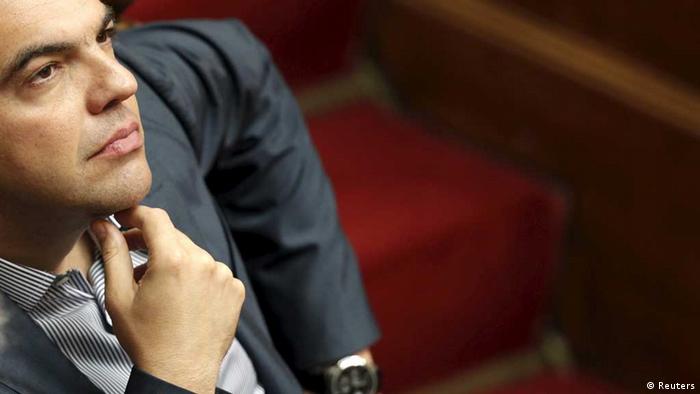EUROZONE CRISIS Greek parliament prepares to vote second set of reforms
EUROZONE CRISIS
Greek parliament prepares to vote second set of reforms
With normality returning to Greece after the reopening of its banks, lawmakers are due to vote on a second batch of reforms. Amid a major rebellion in his party, the prime minister's authority will again be tested.
Greek Prime Minister Alexis Tsipras tried to rally his party on Tuesday ahead of a crucial vote in parliament on the second package of measures demanded by international creditors to open talks on a new bailout deal.
The reforms include changes to the civil code aimed at streamlining legal proceedings and new EU rules on propping up failed banks, decreed after the 2008 financial crisis.
Tsipras said he was aiming to seal this second bailout accord, which could offer Greece up to 86 billion euros ($94 billion) in new loans to bolster its shaky finances and ward off the threat of a forced exit from the euro.
The prime minister is widely expected to get the package through parliament with the support of pro-European opposition parties. But Tsipras has also been facing a growing revolt within his left-wing Syriza party over tax hikes, market reforms and spending cuts as demanded by his international lenders.
"Up until today I've seen reactions, I've read heroic statements but I haven't heard any alternative proposal," he said. Wednesday's vote in parliament would follow last week's vote on economic reforms and budget cuts, which were demanded of Greece as a condition before the start of full bailout talks.
Troika meetings to follow on Friday
Earlier this week, government spokeswoman Olga Gerovasili had said that the Greek government expected to wrap up ongoing bailout talks with its lenders by August 20 - the deadline for debt-crippled Greece to repay 3.2 billion euros owed to the European Central Bank.
Further negotiations were expected to begin immediately after Wednesday's vote in parliament: officials from the three creditor institutions - the European Commission, European Central Bank (ECB) and International Monetary Fund (IMF) - were reportedly expected to arrive in Athens on Friday to start holding meetings with the government immediately.
Dwindling support?
The heads of the centrist To Potami party and the socialist Pasok party both said they would back the Tsipras government over the bailout accord for the time being. But a rebellion within his own party last week saw Tsipras' guaranteed support cut to just 123 votes in the 300-seat parliament, and any further defections might be seen as undermining any prospects for reform. Some government officials have suggested that if support dropped below 120 MPs, Tsipras might have to resign.
The administration, in power for only six months, said it hoped to see a smaller rebellion in Wednesday's vote than last week. However, analysts predict that Tsipras' coalition government might be forced to call an early election if the ongoing revolt within Syriza continues.
Improved rating
Meanwhile, ratings agency Standard & Poor's has lifted its long-term sovereign credit rating on Greece from 'CCC-' to 'CCC+', saying that it believed that default was no longer inevitable in the next six to 12 months. But Standard & Poor's also said it still believed there was a one-in-three chance that Greece could still leave the eurozone.
Part of the improved rating was achieved when Athens showed it was able to pay off billions in debt to the ECB and IMF on Monday with 7.16 billion euros of emergency "bridge" funding granted by the European Union.
ss/cmk (Reuters, AFP, AP)

Comments